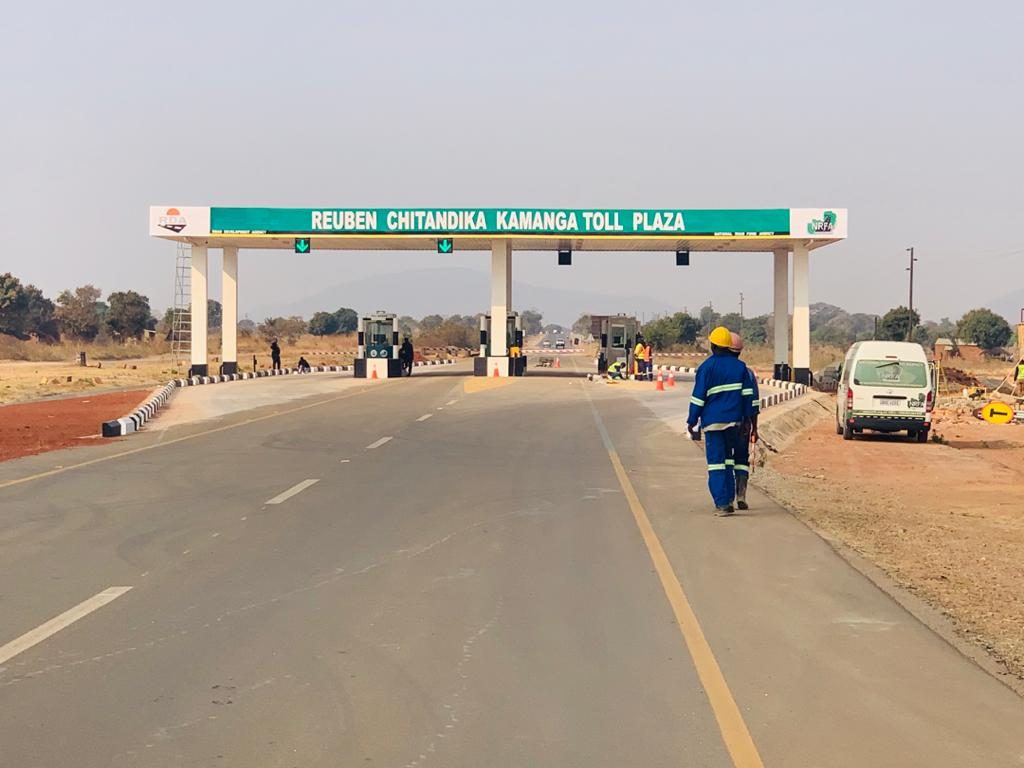Road Tolling Programme, so far so good

During 2020, the National Road Fund Agency (NRFA) escalated the implementation of the National Road Tolling Program through the administration and management of road tolling facilities at inland toll gates and through oversight of collected road tolls at ports of entry.
The implementation of the Road Tolling Program is in conformity with the Agency’s mandate of resource mobilisation as stated in the Road Fund Act No. 12 of 2002 and is also in keeping with the Agency’s mission “to Proactively Mobilise Resources and Effectively Manage and Administer the Road Fund in a Transparent and Sustainable way to ensure Value for Money and Stimulate Socio-Economic Development.”
In the year 2020 five (05) inland toll stations were completed and commissioned, these included:
- Mibenge in Samfya, Luapula Province.
- George Kunda in Mukushi, Central Province
- Alexander Grey Zulu in Nyimba, Eastern Province
- Reuben Chitandika Kamanga in Katete, Eastern Province and
- Kebby Musokotwana in Livingstone, Southern Province
The commissioning of these toll stations created about 105 direct jobs with Toll Collectors recruited from the respective provinces. It must be mentioned that tolling operations stopped at Kapiri Mposhi Weighbridge and Livingstone Weighbridge when the George Kunda and Kebby Musokotwane Toll Gates respectively were officially commissioned.
Further the Kazungula Weighbridge which was also a toll collection point was closed for periodic maintenance which meant that they were no tolling operations from weighbridges as at the end of the year. The total number of operational collection points as at the close of 2020 was thirty six (36), comprising of twenty six (26) inland toll stations and ten (10) ports of entry.
A total of K1.551 billion in tolls revenue was collected in 2020 against the budgeted collection of K1.641 billion representing a collection performance of 94%. The underperformance was mainly attributed to the continued impact of the Covid-19 pandemic on the general business environment at country and regional levels resulting in reduced processed traffic volumes.
However, there was a year-on-year growth of 28% in tolls revenue compared to the 2019 collection on K1.212 billion and this was mainly attributed to commissioning of new toll stations and the implementation of the statutory instrument 74 of 2020 which provides for collection of tolls at inland toll stations from foreign registered vehicles. The immediate revenue impact of SI 74 has been an increase in toll revenue of about K20 million per month.
During 2020, the Agency processed a total of 15, 826,406 vehicle passages at inland toll stations compared to 14, 125, 277 passages in 2019. Out of this figure, 2,637,929 vehicle passages were processed at discounted rates under the Frequent Road User and Local Road User Discount facilities with 2,226,894 being Frequent User Discounts whilst Local User Discount passages stood at 411, 035. The road user discounts accounted for 17% of the total traffic processed.
The electronic toll card payment system has continued to register growth over the years. During the period January – December 2020, a total of K167 million in tolls revenue was collected using this cashless system representing 25% of the total inland collections for the period, representing a 44% growth from 2019 when K116 million was collected through this platform.
The Agency wish to assure all stakeholders that toll collections and disbursements is done in an open and transparent manner with continuous monitoring of the tolling system to ensure that any bottle necks are identified and addressed immediately.
This is done through a control center which has been established at Head Office to provide real time operations oversight at toll stations and in all the booths. Further, we have video recordings for each and every transaction with cumulative totals of the collected revenue from each of the interconnected toll station.
All the transactions in the system have an audit trail which enables verification of all transactions including receipting; and we have opened up all our tolling facilities to various interest groups to appreciate the internal controls and general operations of the road tolling system.
With respect to utilisation of the tolls revenue, we are guided by Section 11 of the Tolls Act No. 14 of 2011 which states that the toll or other charges imposed for the use of a toll road and collected by the Agency shall form part of the Road Fund and shall be used exclusively for the construction, maintenance and rehabilitation of public roads.
We wish to state here that when collected, road tolls are put together with other revenues from Fuel Levy and other Road User Charges and disbursed for all road projects and related activities across the country.
During 2020 we processed a total of 4, 585 interim payment certificates (IPCs) or invoices from various road contractors and consultants valued.
The demand for road infrastructure development remains high while the resource envelope is not adequate to bridge the finance gap for road construction, rehabilitation and maintenance.
We hope to continue on the same growth trajectory in terms of broadening the revenue base and the general outlook for the year 2021 is positive and promising.
